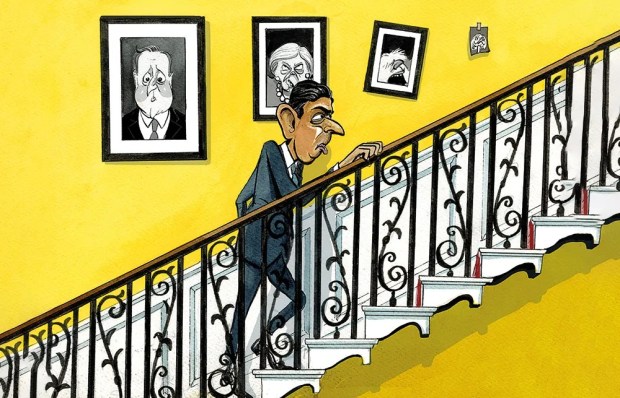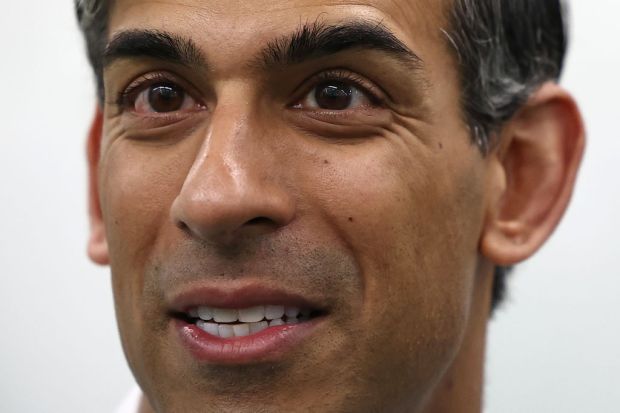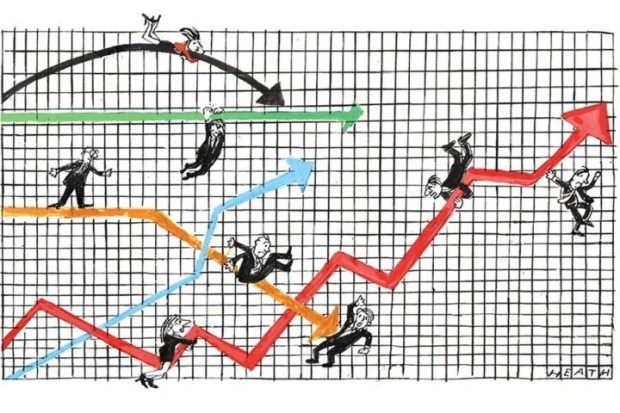‘Whoever wins in September, the party will be stuck. Even in power it remains incapable of generating and delivering credible policies, incapable of using its resources to tackle the challenges ahead. In an uncertain world it struggles to decide what it wants to do, and struggles to implement the few ideas it has. The party has become a machine for garnering headlines and votes but is now starting to stall. Insulated by a media which also focuses on the day-to-day rigmarole of politics as soap opera, our leaders are missing the signs of short- and long-term crisis which will soon hit. They are failing to adapt, failing to plan. The sirens are ringing, the ground is coming.’
So ended this piece, a year ago today. Since then, a lot has happened, but little has changed. The Conservative party has failed to arrest its decline. To stretch the analogy, it has broken through the cloud cover and is clipping the tops of the trees. The latent faults have become glaring cracks. In burning through the chaos of the last year, the party has shown its inadequacy. It has also ensured its electoral evisceration.
The party would rather whinge about the things it sees holding it back – from civil servants to Just Stop Oil – than utilise anything in its power to address it
Since the start of this year, Labour has held an average lead of 20 points over the Conservatives. Despite the incredulity of many pundits, this points towards a defeat worse than in 1997. Talk of polls narrowing nearer election day is repeated as a heuristic without questioning the logic behind it. It seems just as likely that the economy will continue to bite, the party’s credibility will continue to erode, and there is every chance its short campaign could collapse into chaos.
The party now seems too impotent to address the failures that have led it here. It continues to be unable to achieve even the things it desires, opting for government by announcement rather than action. It would rather discuss the trivia which enrages its base than the pressing issues facing the country. The party would rather whinge about the things it sees holding it back – from civil servants to Just Stop Oil – than utilise anything in its power to address it.
More than that, the party has become disconnected from the future of the country it wishes to govern. The Conservatives have shrunk to an unprecedented position in the age split of their voters. Only in the over 65s do they have a plurality of support. The entire working-age electorate intends to reject them at the next election.
The figures are stark. Only around 6 per cent of under-24s intend to vote Tory, far lower than ever before. For the cohort above that, those 25-49, a group that includes working parents and those in settled careers and homes, it is less than 15 per cent. Even among those approaching retirement, the Conservatives can’t count on more than a third supporting them.
None of this should be surprising. The party offers these voters almost nothing. Neither its retail policies nor its rhetoric in any way appeals to these demographics. For the younger groups in particular, the party ignores or worsens their problems and tells them it hates them, then wonders why the feeling is mutual.
On housing, the Conservative party largely refuses to accept this is an issue. It ignores the calamitous reality that affects even the sort of young people who might otherwise be Conservative. Even the highest-paid young professionals in London live in grotty flatshares at the whim of landlords, before getting to the point where perhaps they might be able to shell out the best part of a million quid on a two-bed where it doesn’t feel safe to walk home, or a family home with a multi-hour commute.
Elsewhere, when the party talks of cutting tax it ignores perhaps the most significant tax it has imposed. Since 2012, the student fees system has acted as a de facto graduate tax, draining the incomes of those who went to university with an extra levy. The government takes 13 per cent more of the pay of a ‘Plan 2’ graduate earning £40,000 than someone without a degree. Caught between the Exchequer and their landlords, the young have little economic incentive to vote Conservative, even if they are out-earning most of the country.
On other pressing matters, the party just seems uninterested. In discussions on stagnant economic growth, it can employ old memes about tax cuts, but offers little else to unleash the economy. On immigration, it says one thing and does another. It has offered no real answer on the costs of social care or childcare. Nor does it have an answer to the looming rise of dependency ratios and escalating health costs. It has now begun to waiver on the issue of tackling climate change. Every impending major issue seems sidelined, kicked into the ‘Too hard’ pile and left to worsen.
The party is instead more often babbling about minutiae. Clutching at the issues that appeal to angry boomers in Facebook groups or seeking to ‘own the libs’. Railing against working from home, or managers in the NHS, without real thought for how these issues work. They party plays to the gallery on social media, their associations, or certain corners of the press, unaware of the huge challenges which are lurking on the horizon. Even its more centrist figures focus their energies against the sugar content of drinks or half-baked regulation of the internet.
Almost all of the optics of the party are now geared towards the ageing. Last week Rishi Sunak posed in Thatcher’s old Rover. No one under the age of 55 at the next election could have ever voted for a party led by her. Her first election was as far from us today as Baldwin was from hers. The tortured nostalgia for the half-remembered matriarch can be aimed only at voters collecting their pensions.
A change to inheritance tax too, seemingly the Tories’ big election idea, would be geared towards older voters – those whose parents are dying in their 80s and are starting to think of their own estate. Especially as absent any spending cuts it would mean shifting the burden further onto those of working age. The party is going all-in on gerontocracy.
The whole message is becoming repugnant to voters below the pensionable age. The party all too often seems to despise younger people and the way they live, blaming them for the structural issues that affect them, and ridiculing their values.
This presents a problem for the Tories beyond the next election. The demographic they rely on for support is naturally shrinking, and there is no guarantee that pensioners in a decade will vote like pensioners today. Indeed, there is every chance that they become more trenchantly anti-Tory unless the party pivots to offering them something more than a Culture War with Thatcherite cosplay.
It will be hard to win back the voters who feel let down by the Tories. The last decade or so of government has involved juggling and then disappointing a large electoral coalition. Now that coalition is coming together against them to produce a catastrophic defeat. Unless they do something to reverse this the party looks to be out of power for many years – it is simply impossible to win with deep unpopularity across all but one demographic.
The party all too often seems to despise younger people and the way they live, blaming them for the structural issues that affect them, and ridiculing their values
It also becomes self-reinforcing. If the under-60s aren’t voting for you, they also aren’t becoming party members, officials, or candidates. Already most of the Tory selection meetings look like they are in the local nursing home. Active members are always a minority of the party, but the fewer votes it gets the more marginal, and frankly weird, that group becomes. This hampered the Tories on the return from 1997, but even then a quarter of young people were voting Tory.
Now, there is a real risk the party will age out, unable to replenish itself. With the party languishing among young people, the sorts you might expect to be the members, MPs and ministers of the 2040s probably don’t even vote Tory today. Those that do seem often begrudgingly drawn to it by some combination of sunk costs and vain hope. They certainly tell their friends that that party is a disaster, even if they don’t let on to CCHQ in case it stunts their political career.
The party’s approach to itself looks quite like its approach to policy. It is inadequately prepared for the challenge ahead, blind to the looming crisis and its own mistakes. It is trapped on the daily point scoring irrelevancies, while struggling to follow through from diagnosis to action on the problems.
Politics needs a spectrum of parties. It seems impossible that right-wing ideas and values can be simply vanquished from the scene. Conservatism has to survive in some form – and has to come up with compelling answers to the challenges of the future. Yet it is hard to see what role the Tory party plays in this without serious correction. It has in its favour the institutional inertia of existing parties, combined with the way our first past the post system entrenches incumbents against new start-up challengers.
The Tory party is one of the longest-lasting and most successful forces in global politics. It cannot, however, take its continued survival for granted. In the past it has survived because it has been able, largely, to ride the waves of social, political and policy change. It has adapted, pairing its long-standing philosophies with at times radical policy thinking and implementing them, broadly successfully. This takes effort and thought.
The party need not ever be universally loved. It must, however, have broad enough appeal to be able to win elections. It cannot simply become the political wing of the boomer-Facebook-complex. Nor can it become beholden to a narrow seam of angry reactionaries who simply seek to rail at the modern world.
The problem now is that the party seems largely to have given up. Its legislative agenda for the remaining term is light. Current policy announcements are weak and half-hearted. It is approaching the next election fight with little zeal or enthusiasm. It has let go of governing, it has let go of fighting – and, increasingly, has let go of thinking. The most interesting conversations about policy, and the future, are happening outside of it. It is not saving itself, nor giving anyone else a reason to.
The Tory party has always tried to moderate between tradition and modernity. It has sought to balance the legacy of those who have gone before with those yet to come. Now it risks failing to do this, slipping away from all but one generation – becoming utterly unwanted by the young, and in turn almost blind to the future of the country. This will result in an electoral reckoning, but it remains to be seen whether this shock will be conducive to its rejuvenation.
When a plane crashes, an entire industry bursts into life to study why and to prevent it from happening again. Vital lessons are gleaned from the wreckage and future problems are prevented. It is now clear to everyone that the Tories are going to crash. The question is whether the party will be in a state to fix its issues and focus on the future.
This article first appeared on John Oxley’s Substack.
Got something to add? Join the discussion and comment below.
Get 10 issues for just $10
Subscribe to The Spectator Australia today for the next 10 magazine issues, plus full online access, for just $10.




















Comments
Don't miss out
Join the conversation with other Spectator Australia readers. Subscribe to leave a comment.
SUBSCRIBEAlready a subscriber? Log in